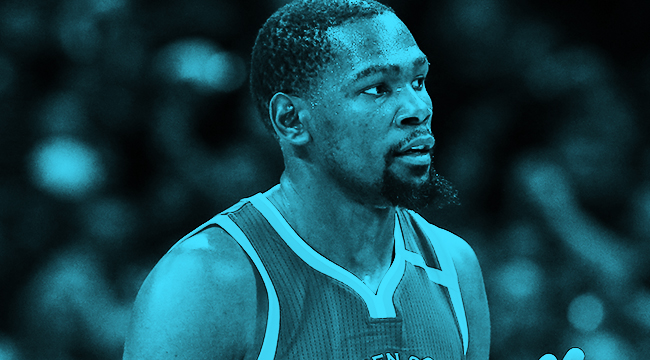
“That hashtag wants me dead, but I don’t mind. It’s just another way we grieve.” — John K. Samson, ‘Select All Delete‘
It’s easy to feel outnumbered online when you have 16.9 million followers on Twitter. That’s really the only explanation I can come up with for Kevin Durant having alternate Twitter accounts. I mean, he says he doesn’t. He also says he’s sorry for doing something that he should not have. Whatever the exact reason, be it multiple accounts or a simple slip (or two) of the thumbs, it’s clear that something strange happened here. More importantly, Durant felt like he had to defend himself from randos online.
What I’ve been thinking about since he slipped up and apologized, though, is why? He’s a wildly talented basketball player. He’s an NBA champion. A Finals MVP. He’s likely to go down as one of the game’s best ever players. And yet, he did some of the weirdest, shadiest stuff you can imagine on a social media site that alternates between breathtakingly dumb and infuriating at any given moment.
It’s such a deeply weird thing for a person of such stature to do. But Twitter is also a uniquely weird social media network because of how isolated you can be. It’s a funnel in every way, both in the feed you view and the interactions you have with those that follow you. Durant follows just over 1,400 people on Twitter, which is a fairly reasonable number and enough to cast a wide net for your timeline. But he has nearly 17 million following him, and if even a fraction of those people respond or interact on a daily basis it’s a constant, overwhelming deluge of information.
Never read the comments, the conventional wisdom says, but the perpetual waves of mentions is just incomprehensible to someone with just a few hundred or thousand followers. Sure, there are filters. There are safeguards. There is the option of never looking at all. But even if all the hate goes unanswered, it’s still looming there.
There’s no defending what Durant did. But it’s clear that an open outlet for deprecation isn’t ideal for someone who puts his haters words on the soles of his shoes. Call Durant fragile or narcissistic or whatever you’d like, but proving people wrong was a huge part of his motivation this past season. It changed the way he approached his public image, and until he won a title with the Warriors, Durant was mostly reticent online. But when the Warriors won their second title in three years and Durant finally got his, things changed.
Affectionately called the Summer of KD around these parts, it was delightful to see Durant back to interacting with fans and being his old self again. Almost all of the interactions were charming. He hooked up a kid with a free pair of shoes because he asked. He joked that a teacher who badmouthed him in a handout should be “fired and throw in jail.” He was outspoken politically.
Durant was loose and conversational in a way many athletes struggle to be in any medium, let alone the digital one. For every Joel Embiid in sports, there’s an ocean of boring athletes unwilling or unable to communicate their personalities to the masses. For a while, Durant became one of those athletes until winning set him free once more. Then he truly embodied his Twitter bio: “IM ME, I DO ME, AND I CHILL.”
Sometime over the summer, Durant changed his Twitter avatar to Ham from The Sandlot. Draymond Green was spotted at Mayweather-McGreggor wearing a “You’re killing me, Smalls” shirt. It looked like the entire team might take take on his not-so serious attitude. Winning can change a lot, and with his championship legacy secure it looked like Durant was going to go back to having fun while winning titles and generally being one of the best players in the league.
The Warriors are now “perplexed” by Durant’s summer because it took a turn for the worse. Before that, The Summer of KD was harmless fun. But that’s the story that so often unfolds when athletes interact like normal people online. With such a huge audience watching, eventually the trouble comes. But KD wasn’t sliding into DMs to get girls or offending wide groups of people with homophobic or sexist comments like other athletes. He picked the weirdest way possible to talk trash about Billy Donovan and the Thunder. Then he actually went and fessed up about doing it.
Durant’s failings all stemmed from his willingness to engage the common fan. He gave out shoes and responded to websites and talked hoops with some folks online. When Durant did that it was charming because, in a way, it validated those opinions and websites and fans. But the end it was that validation in KD that brought him down. We may think athletes are stronger or smarter than us — that they are some more evolved form of human — but Durant’s a great example of just how false that narrative is. A millionaire having the year of his life got bored online and started defending himself from the endless, unchangeable opinions of the Internet hive mind.
All the money and success in the world couldn’t pull him out of the @s and away from exposing the worst parts of his mind’s doubts and fears. There’s no real lesson to take from this that’s of any use. Maybe don’t make burner Twitter accounts to defend yourself from others. Be more vigilant when you’re managing multiple social media profiles, I guess. Perhaps the easy answer is to never Tweet.
Regardless, so ends the Summer of KD. Not in triumph or with a laugh, but a truly weird social faux pas in a digital world where good things only end when they’ve gone too far.






